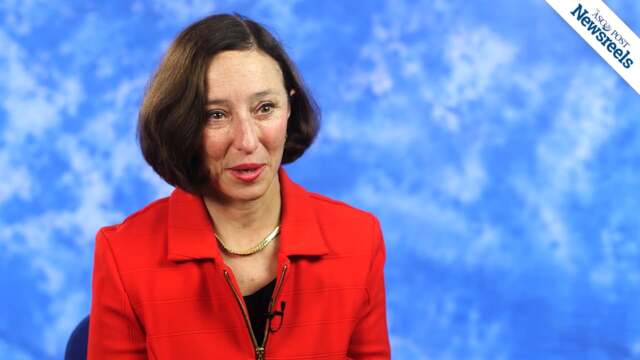10-Year Survival With vs Without Axillary Dissection in Invasive Breast Cancer With Sentinel-Node Metastasis
As reported in JAMA by Giuliano et al, 10-year overall survival in the ACOSOG Z0011 (Alliance) trial with sentinel lymph node dissection (SLND) alone was noninferior to that with axillary lymph node dissection (ALND) in women with clinical T1 or T2 invasive breast cancer, no palpable axillary...
What Is the Most Important Factor Women Consider in Deciding on SERM Use to Reduce Their Risk of Breast Cancer?
Currently, two medications have been approved by the U.S. Food and Drug Administration to reduce the risk of breast cancer: tamoxifen and raloxifene. Both medications, selective estrogen receptor modulators (SERMs), have been shown to reduce the risk for breast cancer by up to 50% in prevention...
ASTRO 2017: Shorter Course of Radiation Treatment Safe for Breast Cancer Patients Under 50
A higher-dose, shorter form of radiation is safe, effective, and no more damaging to the breast tissue or skin of breast cancer patients under age 50 than it is in older patients. This is the finding of a study led by researchers from Perlmutter Cancer Center at New York University (NYU)...
Shorter Course of Radiation Therapy Safe for Younger Women With Breast Cancer
A higher-dose, shorter form of radiation is safe, effective, and no more damaging to the breast tissue or skin of women with breast cancer under age 50 than it is in older patients, according to findings led by researchers from Perlmutter Cancer Center at NYU Langone Health, and presented at the...
Cancer Has Plagued My Family
My father, who was a physician, taught me at an early age to pay attention to any changes in my body. His advice has stood me in good stead for more than 83 years and probably saved my life more than once. In 1984, just before I turned 50, something was bothering me about my right breast. I could...
Adjuvant Pertuzumab in HER2-Positive Breast Cancer: Value Yet to Be Demonstrated
The ASCO Post issue of June 25, 2017, did an excellent job of summarizing the results and controversy generated by the initial results of the APHINITY trial, reported at the 2017 ASCO Annual Meeting and published simultaneously online in The New England Journal of Medicine.1 With a median follow-up ...
Clinical Trials Actively Recruiting Patients With Breast Cancer
The information contained in this Clinical Trials Resource Guide includes actively recruiting clinical studies focused on patients with breast cancer. These studies highlight neoadjuvant combination therapy, cell vaccines, novel imaging techniques, radiotherapy, and more. All of the studies are...
ASTRO 2017: Accelerated Breast Radiation Therapy Following Mastectomy Can Shorten Treatment Time While Maintaining Tumor Control
Radiation therapy following mastectomy for intermediate-stage, high-risk breast cancer can be shortened from 5 to 3 weeks while maintaining tumor control rates in the breast and surrounding region that are equivalent to conventional treatment, according to research presented by Sun et al at the...
Preexisting Mental Illness and All-Cause and Breast Cancer Mortality in Elderly Breast Cancer Patients
A study using linked Surveillance, Epidemiology, and End Results–Medicare data has shown a significantly increased risk of all-cause mortality and a nonsignificantly increased risk of breast cancer–specific mortality in elderly breast cancer patients with preexisting severe mental...
ASTRO 2017: Patients With Breast Cancer Find Radiation Therapy Experience Better Than Expected
A new survey finds breast cancer patients’ actual radiation therapy experiences largely exceeded their expectations. The survey, which addressed the fears and misconceptions regarding radiation therapy for breast cancer, found that more than three-fourths of the breast cancer patients...
Shulian Wang, MD, and Benjamin Movsas, MD, on Breast Cancer: Radiation Therapy After Mastectomy
Shulian Wang, MD, of the National Cancer Center in Beijing, and Benjamin Movsas, MD, of the Henry Ford Health System, discuss study results on the use of hypofractionated radiation therapy after mastectomy for the treatment of high-risk breast cancer (Abstract PL01).
Study Finds Smoking Negatively Impacts Long-Term Survival After Breast Cancer
According to the American Cancer Society, about 316,120 new cases of breast cancer will be diagnosed this year, and over 40,000 women will die of the disease. Between 10% and 20% of women diagnosed with cancer are current smokers. Now, a prospective study by Parada et al investigating whether...
Trastuzumab-Based Regimens in Older Women With Early Breast Cancer
A comparative analysis of outcomes with two different trastuzumab (Herceptin)-based adjuvant regimens in older women with early HER2-positive breast cancer found little difference in safety and efficacy between treatments. The study was reported by Katherine E. Reeder-Hayes, MD, MBA, of the...
Tumor-Infiltrating Lymphocytes in African Americans and European Americans With Triple-Negative Breast Cancer
Triple-negative breast cancer is a highly aggressive breast cancer that lacks hormone receptors and overexpression of human epidermal growth factor receptor 2 (HER2/neu), and, therefore, there are no targeted treatments available for the cancer. Triple-negative breast cancer afflicts African...
Religiously Tailored Educational Intervention to Encourage Mammography in American Muslim Women
Despite the U.S. Preventive Services Task Force recommendation that women between the ages of 50 and 74 undergo mammography every 2 years, only about 50% of American Muslim women do so, compared with 67% of all American women. A study by Padela et al investigating the mammography-related barrier...
Surgeon-Initiated Gene-Expression Profile Testing in Early-Stage Breast Cancer and Time to Start of Chemotherapy
In a single-center study reported in the Journal of Oncology Practice, Losk et al found that an intervention including surgeon initiation of gene-expression profile testing with Oncotype DX significantly reduced the time to testing, receipt of testing results, and initiation of chemotherapy in...
ESMO 2017: MONARCH 3: Abemaciclib as Initial Therapy Improves Outcome in Endocrine-Sensitive Advanced Breast Cancer
The results of the MONARCH 3 trial, presented at the European Society for Medical Oncology (ESMO) 2017 Congress in Madrid (Abstract 236O_PR), showed that adding the cyclin-dependent kinase (CDK) 4/6 inhibitor abemaciclib to endocrine therapy improved progression-free survival compared to endocrine...
Whole-Genome Sequencing Reveals Breast Cancers With Mismatch-Repair Deficiencies
Cancers caused by mismatch repair (MMR)-deficiency involve gene mutations that affect the ability of the cell to repair the mistakes that may occur during the DNA replication process. MMR-deficient tumors have 10 to 100 times more mutations than tumors with intact MMR pathways. A study...
First-in-Human Study of Tamoxifen Metabolite Z-Endoxifen in Endocrine-Refractory Metastatic Breast Cancer
A first-in-human phase I study of the oral tamoxifen metabolite Z-endoxifen showed high drug exposure, acceptable toxicity, and antitumor activity in endocrine-refractory estrogen receptor–positive metastatic breast cancer. The findings were reported in the Journal of Clinical Oncology by...
ESMO 2017: Adding Taselisib to Neoadjuvant Letrozole Improves Outcomes in Early Breast Cancer
Adding taselisib to letrozole before surgery significantly improved outcomes for patients with early breast cancer that was both estrogen receptor–positive and HER2-negative, according to results of the LORELEI trial, presented at the European Society for Medical Oncology (ESMO) 2017 Congress ...
Judy E. Garber, MD, MPH, on Triple-Negative Breast Cancer: An Update
Judy E. Garber, MD, MPH, of Dana-Farber Cancer Institute, offers expert perspectives on the role of PARP inhibitors in treating triple-negative breast cancer.
Marleen Kok, MD, PhD, on Triple-Negative Breast Cancer: Results From the TONIC Trial
Marleen Kok, MD, PhD, of The Netherlands Cancer Institute, discusses findings from an adaptive phase II noncomparative trial of nivolumab after induction treatment in triple-negative breast cancer (Abstract LBA14).
Sibylle Loibl, MD, PhD, on Metastatic Breast Cancer: Expert Perspective on CDK4 Inhibitors
Sibylle Loibl, MD, PhD, of the German Breast Group, summarizes a session she chaired in which the rationale to target CDK4, data on efficacy of the inhibitors, and triple combination therapy with PI3K were discussed.
ESMO 2017: MINDACT Study in Early-Stage Breast Cancer Shows Even Small Tumors Can Be Aggressive
Even small tumors in the breast can be aggressive, according to a study in patients with early-stage breast cancer presented at the 2017 European Society for Medical Oncology (ESMO) Congress in Madrid (Abstract 150O_PR). Researchers found that 24% of small tumors were aggressive, and patients...
Accelerated vs Standard Epirubicin and Capecitabine vs CMF in Breast Cancer
The phase III UK TACT2 trial has shown no efficacy benefit of accelerated vs standard epirubicin and a potential quality-of-life benefit of capecitabine vs CMF (cyclophosphamide, methotrexate, fluorouracil) as adjuvant therapy for breast cancer. The findings were reported in The Lancet Oncology by ...
Journal of Clinical Oncology Literature Update
Staying up-to-date in the fast-paced world of oncology literature is a daunting task at best. To assist with that task, The ASCO Post has assembled an assortment of studies recently published in the Journal of Clinical Oncology. The topics range from therapy for stage IV non–small cell lung cancer...
FDA Clears Mammography Device With Option for Patient-Assisted Compression
On September 1, the U.S. Food and Drug Administration (FDA) cleared the first 2D digital mammography system that allows patients to increase or decrease the amount of compression applied to their own breast before the mammogram x-ray is taken. “Regular mammograms are an important tool in...
Genetic Variant May Significantly Lower Risk of Breast Cancer in Women With History of Preeclampsia
Researchers have demonstrated that women with a history of preeclampsia have as much as a 90% decrease in breast cancer risk if they carry a specific common gene variant. Further studies are now underway to determine the mechanism of this protection in an effort to develop new breast cancer...
FDA Grants Breakthrough Therapy Designation to DS-8201 for HER2-Positive Metastatic Breast Cancer
On August 29, Daiichi Sankyo announced that the U.S. Food and Drug Administration (FDA) has granted Breakthrough Therapy designation to DS-8201, an investigational HER2-targeting antibody-drug conjugate, for the treatment of patients with HER2-positive, locally advanced or metastatic breast cancer...
FDA Approves Fulvestrant as Monotherapy for Expanded Use in Breast Cancer
On August 28, the U.S. Food and Drug Administration (FDA) approved fulvestrant (Faslodex) at 500 mg as monotherapy for expanded use in women with hormone receptor–positive, human epidermal growth factor receptor 2 (HER2)–negative advanced breast cancer who have gone through menopause...
Loss of Heterozygosity in BRCA Gene May Influence Survival in Breast and Ovarian Cancers
Researchers in the Perelman School of Medicine at the University of Pennsylvania have found a relationship between the genetics of tumors with germline BRCA1/2 mutations—and whether the tumor retains the normal copy of the BRCA1/2 gene—and risk for primary resistance to a common...
Sacituzumab Govitecan in Heavily Pretreated Metastatic Triple-Negative Breast Cancer: A Step in the Right Direction
IN A SINGLE-ARM multicenter trial reported by Bardia and colleagues1 and reviewed in this issue of The ASCO Post, the use of sacituzumab govitecan (IMMU-132) showed a response rate of 30% and a clinical benefit rate of 46% in heavily pretreated patients with metastatic triple-negative breast...
Anti–Trop-2 Antibody-Drug Conjugate Produces Durable Responses in Metastatic Triple-Negative Breast Cancer
AS REPORTED in the Journal of Clinical Oncology by Aditya Bardia, MD, MPH, of Massachusetts General Hospital Cancer Center and Harvard Medical School, and colleagues, the anti–Trop-2 antibody-drug conjugate sacituzumab govitecan has been found to produce durable responses in patients with heavily...
AKT Inhibitor Ipatasertib in Metastatic Triple-Negative Breast Cancer
The randomized phase II LOTUS trial has shown improved progression-free survival with the addition of the AKT inhibitor ipatasertib to paclitaxel in the first-line treatment of metastatic triple-negative breast cancer. These results were reported by Kim et al in The Lancet Oncology. The PI3K/AKT...
Comparison of Screening Recommendations for Mammography
When to initiate screening for breast cancer, how often to screen, and how long to screen are questions that continue to spark emotional debates. A new study compares the number of deaths that might be prevented as a result of three of the most widely discussed recommendations for screening...
A Personal Tribute to Angela H. Brodie, PhD, a Scientist Who Transformed Breast Cancer Treatment
Angela H. Brodie, PhD, a pioneer in breast cancer research, passed away on June 7, 2017, from complications of Parkinson’s disease and pancreatic cancer. An obituary for Dr. Brodie was published previously in the June 25, 2017, issue of The ASCO Post. Here, Dr. Balkees Abderrahman shares a...
Making Our Future Plans Happen Now
The following essay by Hope S. Rugo, MD, is adapted from The Big Casino: America’s Best Cancer Doctors Share Their Most Powerful Stories, which was coedited by Stan Winokur, MD, and Vincent Coppola and published in May 2014. The book is available on Amazon.com and thebigcasino.org. I was in...
Triple-Negative Breast Cancer: Practical Approach, Promising Research
Triple-negative breast cancer has a reputation for being a particularly challenging malignancy, but breast cancer specialist Nancy Davidson, MD, Senior Vice President of the Clinical Research Division at the Fred Hutchinson Cancer Research Center, Seattle, put this in perspective in a recent...
Surveillance Mammography by Life Expectancy in Older Breast Cancer Survivors
In a study reported in the Journal of Clinical Oncology, Freedman et al found that many older breast cancer survivors with a limited life expectancy still undergo annual surveillance mammography despite the absence of known benefits. Study Details The study involved analysis of National Health...
Partial-Breast and Reduced-Dose Radiotherapy After Breast-Conserving Surgery
The UK IMPORT LOW phase III trial has shown noninferiority in local relapse for partial-breast and reduced-dose vs standard whole-breast radiotherapy after breast-conserving surgery in early breast cancer. These study results were reported by Coles et al in The Lancet. Study Details In the...
Genomic Characteristics and Immune Infiltration in Triple-Negative Breast Cancer
In a study reported in JAMA Oncology, Karn et al found that triple-negative breast cancers with high immune gene expression levels were characterized by lower clonal heterogeneity, reduced copy number alterations, and lower somatic mutation and neoantigen loads. Study Details In the study, DNA...
Effect of Radiotherapy After Breast-Conserving Surgery Among Breast Cancer Subtypes
In an analysis of the Swedish Breast Cancer Group 91 Radiotherapy trial reported in the Journal of Clinical Oncology, Sjöström et al found that adjuvant radiotherapy vs no radiotherapy had an increased benefit in triple-negative disease and little effect on HER2-positive disease in a...
Predisposition to Breast Cancer Due to Mutations Other Than BRCA1 and BRCA2 in Ashkenazi Jewish Women
A cohort study in Ashkenazi Jewish women with breast cancer identified mutations other than BRCA1 and BRCA2 founder alleles that were associated with cancer risk. These study results were reported by Walsh et al in JAMA Oncology. Among Ashkenazi Jewish women, three mutations in BRCA1 and BRCA2...
Ovarian Function Recovery During Anastrozole Therapy in Postmenopausal Patients With Breast Cancer
In the phase III DATA trial reported in the Journal of the National Cancer Institute by van Hellemond et al, 12% of women with breast cancer who had chemotherapy-induced ovarian function failure experienced ovarian function recovery during 30 months of aromatase inhibitor therapy with anastrozole....
Perioperative Anti-inflammatory, Antistress Drugs May Reduce Postsurgical Metastatic Disease Recurrence
Most cancer-related deaths are the result of postsurgical metastatic recurrence. A new Tel Aviv University (TAU) study published by Shaashua et al in Clinical Cancer Research found a specific drug regimen administered prior to and after surgery significantly reduces the risk of postsurgical cancer...
I Live My Life in 3- to 6-Month Increments
I first noticed a lump in my left breast in 2001 while taking a shower and shrugged it off. After all, men don’t get breast cancer. To assuage my wife’s concern that I at least have the lump examined, I consented to see our family physician, who agreed that men don’t get breast cancer because, he...
Trastuzumab-Based Regimens in Older Women With Early Breast Cancer
A comparative analysis of outcomes with two different trastuzumab (Herceptin)-based adjuvant regimens in older women with early HER2-positive breast cancer found little difference in safety and efficacy between treatments. The study was reported by Reeder-Hayes et al in the Journal of Clinical...
One Size May Not Fit All: Thoughts on the New Adjuvant Bisphosphonate Guideline for Early-Stage Breast Cancer
The oncology community has now conducted several prospectively designed, hypothesis-driven randomized clinical trials among women with breast cancer to address this question: Do adjuvant bisphosphonates decrease the risk of breast cancer bone metastases and other recurrence? A meta-analysis1 by...
Cancer Care Ontario and ASCO Clinical Practice Guideline: Use of Adjuvant Bisphosphonates and Other Bone-Modifying Agents in Breast Cancer
As reported in the Journal of Clinical Oncology by Sukhbinder Dhesy-Thind, MD, MSc, FRCPC, of Juravinski Cancer Centre, Hamilton Health Sciences, and colleagues, Cancer Care Ontario and ASCO have issued a clinical practice guideline on the use of adjuvant bisphosphonates and other bone-modifying...
Advances in the Treatment of Triple-Negative Breast Cancer
WITHIN THE SPECTRUM of breast cancer subtypes, triple-negative disease is “particularly troubling,” but better scientific understanding of this malignancy is leading to advances in its treatment, according to breast cancer expert Nancy Davidson, MD. Triple-negative breast cancer does not express...




